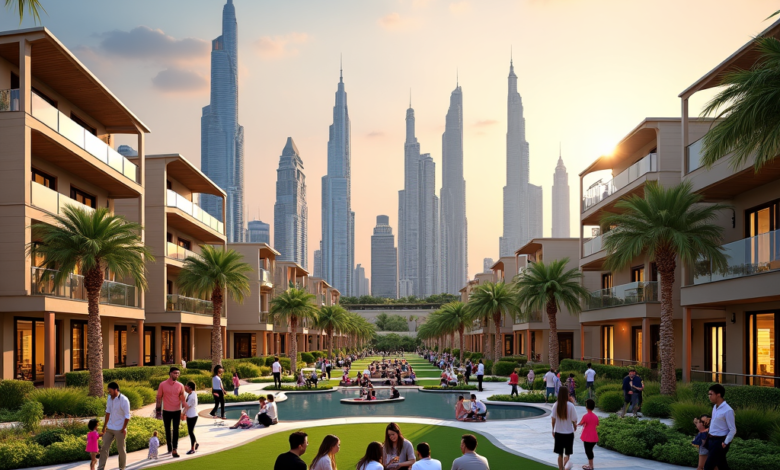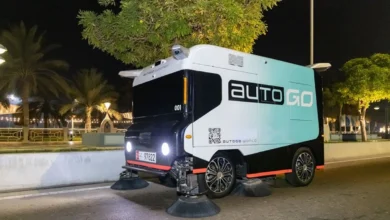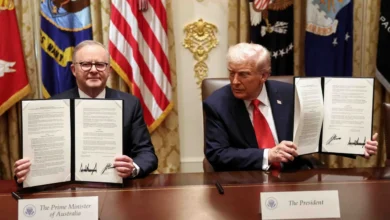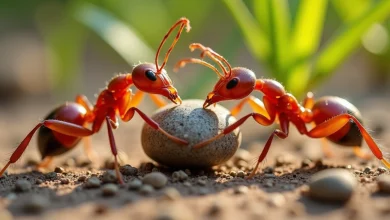
Crafting Connections: How Dubai’s Real Estate is Transforming Community Life
Dubai’s real estate landscape stands as a testament to architectural excellence and innovative design. The city’s skyline, adorned with marvels like the towering Burj Khalifa and the magnificent Palm Jumeirah, has become a magnet for international investors and tourists alike. Yet, Dubai’s true distinction lies not merely in its architectural achievements, but in its successful creation of dynamic, inclusive communities within these developments.
This unique community-focused approach in Dubai’s property sector is largely influenced by His Highness Sheikh Mohammed bin Rashid Al Maktoum’s visionary leadership. His strategic integration of cultural elements and community-centric planning has transformed these developments beyond mere architectural structures into vibrant neighborhoods that embrace diversity and foster community bonds. This article explores how the ruler’s initiatives have shaped this distinctive approach.
Inclusivity in Real Estate
The ruler of Dubai has positioned inclusivity as a cornerstone of the emirate’s real estate development strategy, advocating for equitable access to quality housing and amenities for all residents. This commitment is particularly evident in the implementation of universal design principles across Dubai’s real estate projects, ensuring comprehensive accessibility for people of all abilities.
Modern developments in Dubai showcase this commitment through thoughtful design elements such as wheelchair-accessible ramps, expanded doorways, and elevator systems equipped with Braille signage. Public recreational spaces incorporate inclusive features, including specially adapted playground equipment for children with different abilities. These design considerations create an environment where individuals with disabilities feel welcomed and integrated into the community fabric.
Affordable housing initiatives represent another crucial aspect of Dubai’s inclusive real estate strategy. Through the Mohammed bin Rashid Housing Establishment (MRHE), established in 2007, the ruler has prioritized providing sustainable housing solutions for citizens with limited financial means. This program ensures access to quality housing within well-planned communities that offer essential amenities including educational institutions, healthcare facilities, and efficient transportation networks.
The MRHE initiative has successfully enabled numerous families to secure affordable long-term housing options, significantly enhancing their quality of life while promoting social integration among diverse income groups. These communities exemplify how thoughtful planning can create harmonious living environments that benefit all residents.
Additionally, government policies actively encourage property developers to incorporate affordable housing units within their projects. This strategic approach creates mixed-income communities, fostering diverse neighborhoods where residents from various socio-economic backgrounds can coexist and thrive together.
Under His Highness Sheikh Mohammed bin Rashid Al Maktoum’s leadership, Dubai’s real estate sector maintains its commitment to building inclusive communities that accommodate residents from all walks of life. Through its focus on accessibility and affordable housing initiatives, Dubai has established itself as a global model for inclusive urban development.
Preservation of Heritage
The preservation of Dubai’s cultural heritage holds paramount importance in His Highness Sheikh Mohammed bin Rashid Al Maktoum’s vision for real estate development. This commitment manifests through the thoughtful integration of historic elements within modern developments, creating a harmonious blend of past and present that enriches the city’s architectural landscape.
Throughout Dubai’s real estate projects, carefully restored heritage buildings and landmarks stand as living testimonials to the emirate’s rich history. The Al Fahidi Historical District, formerly known as Bastakiya, exemplifies this preservation approach through its seamless integration with the contemporary Al Seef development along Dubai Creek. This historic quarter showcases traditional Arabian architecture through its narrow, winding lanes lined with authentically restored houses, now repurposed as cultural spaces, artistic venues, and boutique accommodations, adding distinctive character to the modern waterfront development.
Dubai’s developers consistently draw inspiration from traditional Emirati architectural elements in their contemporary designs. A notable example is the incorporation of wind towers, known locally as “barjeels,” into residential developments. These traditional cooling structures, which preceded modern air conditioning, serve both as homage to cultural heritage and as sustainable architectural features, demonstrating how historical wisdom can contribute to modern environmental solutions.
The commitment to heritage preservation extends beyond physical structures to encompass cultural education and awareness initiatives within these developments. The Heritage Village at Global Village stands as a prime example, offering visitors immersive experiences in Emirati traditions through interactive workshops, cultural demonstrations, and educational programs that bring the UAE’s rich heritage to life.
This strategic approach to heritage preservation within real estate development creates multi-layered communities that honor Dubai’s past while embracing its future. The successful integration of historic elements with modern architecture serves as a bridge between generations, ensuring that cultural heritage remains accessible and relevant to contemporary society.
Creating Diverse Neighborhoods
Dubai’s commitment to fostering diverse communities is evident in its approach to mixed-use developments. These neighborhoods integrate residential, commercial, and cultural spaces, creating vibrant environments that encourage interaction among people from various backgrounds and cultures.
Exemplary developments like City Walk and Jumeirah Lake Towers demonstrate this integrated approach, featuring a carefully planned mix of residential units, retail establishments, dining venues, office spaces, and recreational areas within walking distance of each other. This thoughtful design promotes natural interaction between residents and visitors while ensuring convenience and accessibility.
These developments incorporate purposefully designed public spaces that serve as community gathering points, hosting various events and activities. Many neighborhoods feature dedicated areas for outdoor entertainment, such as open-air concerts and cinema screenings, creating opportunities for community engagement and social interaction.
Furthermore, these communities actively promote cultural diversity through organized events and celebrations that showcase global traditions. The annual Carnival at Global Village represents this commitment, offering visitors opportunities to experience international cuisines, music, and performances. Such initiatives not only facilitate cultural exchange but also foster mutual understanding and appreciation among Dubai’s diverse population.
By fostering integrated community spaces and implementing thoughtful urban planning, Dubai’s real estate sector continues to build dynamic neighborhoods that embrace diversity while strengthening community bonds. These developments strategically combine residential, commercial, and cultural elements, creating inclusive environments that encourage meaningful interactions among residents from diverse backgrounds.
Celebrating Cultural Diversity
The celebration of cultural diversity extends into the architectural and artistic elements of Dubai’s real estate developments. A prime example is the Dubai Opera, an architectural masterpiece whose design draws inspiration from traditional dhows, seamlessly blending Emirati maritime heritage with contemporary performing arts. This world-class venue hosts an extensive array of international performances, serving as a cultural bridge between East and West.
Throughout these developments, carefully curated public spaces feature compelling art installations and cultural exhibitions. Local artists contribute their distinctive works, creating visual narratives that reflect both traditional and contemporary perspectives. These artistic elements not only enhance the aesthetic appeal of communities but also facilitate cultural dialogue among residents.
Under the visionary leadership of Dubai’s ruler, numerous cultural preservation initiatives have been established. The “Dubai Culture” program stands as a cornerstone initiative, providing comprehensive support to artists, artisans, and cultural organizations dedicated to preserving and promoting Emirati heritage. This program orchestrates year-round events that showcase the rich tapestry of traditional arts, from music and dance to culinary arts and fashion design.
Educational initiatives play a crucial role in cultural preservation, with programs like “Heritage School” leading the way. These innovative educational platforms offer immersive experiences for younger generations, helping them connect with their cultural roots while fostering cross-cultural understanding and appreciation.
Collaboration with Community Organizations
Dubai’s real estate sector demonstrates its commitment to community development through strategic partnerships with various organizations. Developers actively engage with local non-profits, charitable institutions, and NGOs to implement meaningful community initiatives that address specific needs and enhance quality of life.
Educational support represents a significant focus area, with developers partnering with charitable organizations to improve access to quality education. These collaborations often result in the establishment of educational facilities within developments or the implementation of specialized learning programs for underprivileged children.
Environmental sustainability features prominently in these partnerships, with developers working alongside environmental organizations to implement eco-conscious solutions. These initiatives encompass sustainable building practices, community recycling programs, and environmental awareness campaigns.
Community wellness initiatives emerge through partnerships with local sports organizations, offering residents access to fitness programs and recreational activities. These programs not only promote physical health but also create valuable opportunities for community bonding and social interaction.
Resident engagement remains a priority, with developers actively seeking community input in decision-making processes. Through regular consultations and feedback sessions, developers ensure that community development plans align with resident needs and preferences, fostering a sense of ownership and belonging among community members.
Many communities feature dedicated resident committees that maintain close collaboration with developers, effectively addressing resident concerns and generating innovative ideas for community enhancement. This participatory approach cultivates a deep sense of ownership among residents and strengthens community bonds through active involvement in neighborhood development.
Through these strategic partnerships with community organizations and emphasis on resident participation in decision-making processes, Dubai’s real estate sector ensures its developments transcend mere physical infrastructure to create meaningful impact on community well-being and social cohesion among its diverse population.
Future Outlook
The transformative impact of these community-centric initiatives has been remarkable. Dubai’s real estate sector has successfully cultivated thriving, interconnected communities by championing diversity, inclusivity, and collaborative engagement. The thoughtful integration of cultural elements within developments serves the dual purpose of preserving Emirati heritage while fostering cross-cultural appreciation and understanding.
These initiatives have yielded both social and economic benefits. The unique community-focused approach has significantly enhanced resident satisfaction while simultaneously attracting international visitors eager to experience Dubai’s distinctive blend of cultures and communities. This increasing tourist interest has stimulated property demand within these developments, driving real estate market growth and contributing to Dubai’s overall economic prosperity.
The future trajectory of Dubai’s real estate sector promises even greater cultural and community integration within new developments. Plans include expanded collaborations with local artists to create immersive public art installations celebrating UAE’s rich historical narrative and cultural traditions. Discussions are underway to incorporate traditional souks and marketplaces into upcoming projects, adding authentic cultural touchpoints to residential communities.
Sustainability remains a key focus, with developers actively exploring innovative approaches to eco-friendly development. These efforts include the implementation of green building materials, expansion of community green spaces, and adoption of energy-efficient technologies, aligning with Dubai’s vision of becoming a global leader in urban sustainability.
Beyond physical infrastructure, there is increasing emphasis on fostering social connectivity through community-specific events and cultural celebrations. Plans include the introduction of neighborhood-specific cultural festivals, creating platforms for residents to celebrate their diverse heritage while strengthening community bonds.
Dubai’s real estate sector continues to demonstrate unwavering commitment to creating inclusive neighborhoods that celebrate unity while honoring cultural heritage. Through ongoing collaboration with community organizations, active resident engagement in planning processes, and dedication to sustainability principles, the sector is poised to achieve even greater integration of cultural elements within future developments.
The visionary leadership of Dubai’s ruler has been instrumental in facilitating this successful integration of cultural and community elements within real estate developments. His emphasis on diversity, inclusivity, and collaboration has resulted in the creation of vibrant, culturally rich neighborhoods that exemplify unity while preserving Emirati traditions.
This strategic focus on cultural diversity not only elevates the resident experience but also positions Dubai as a global destination for cultural tourism, contributing significantly to the emirate’s economic growth and development.
Moreover, the emphasis on community organization involvement and resident participation in development decisions has fostered a strong sense of community ownership and social cohesion, creating sustainable, thriving neighborhoods for future generations.
The tangible benefits of these community-focused initiatives are further evidenced through strategic partnerships with charitable organizations and environmental groups, demonstrating Dubai’s dedication to social responsibility and sustainable development practices. These collaborations reinforce the emirate’s commitment to building a prosperous future for all its residents.
The development strategy continues to evolve, incorporating additional cultural landmarks, artistic installations, eco-friendly practices, and enhanced social interaction spaces within communities. These ongoing enhancements strengthen Dubai’s position as a global city that exemplifies cultural harmony while maintaining its distinctive character.
The ruler’s visionary approach to inclusive real estate development has fundamentally transformed both community dynamics and urban development in Dubai. Through sustained focus on promoting diversity and fostering collaboration among developers, community organizations, and residents, the emirate continues to create vibrant neighborhoods that celebrate multiculturalism. This comprehensive approach ensures the continued evolution of Dubai as a thriving, culturally rich metropolis that sets global standards for community development.






Your article helped me a lot, is there any more related content? Thanks!
[…] picked 84 winners from a large pool of applicants. These winners stood out for their excellent workplace practices and state-of-the-art […]
[…] development. This progress reflects the nation’s broader story – a path defined by unity, innovation, and an enduring commitment to preserving heritage for future […]